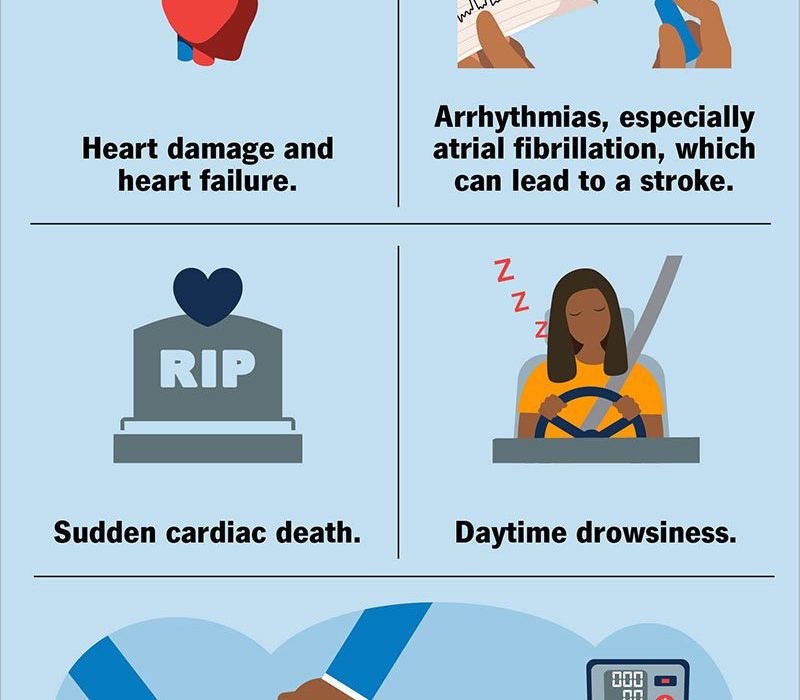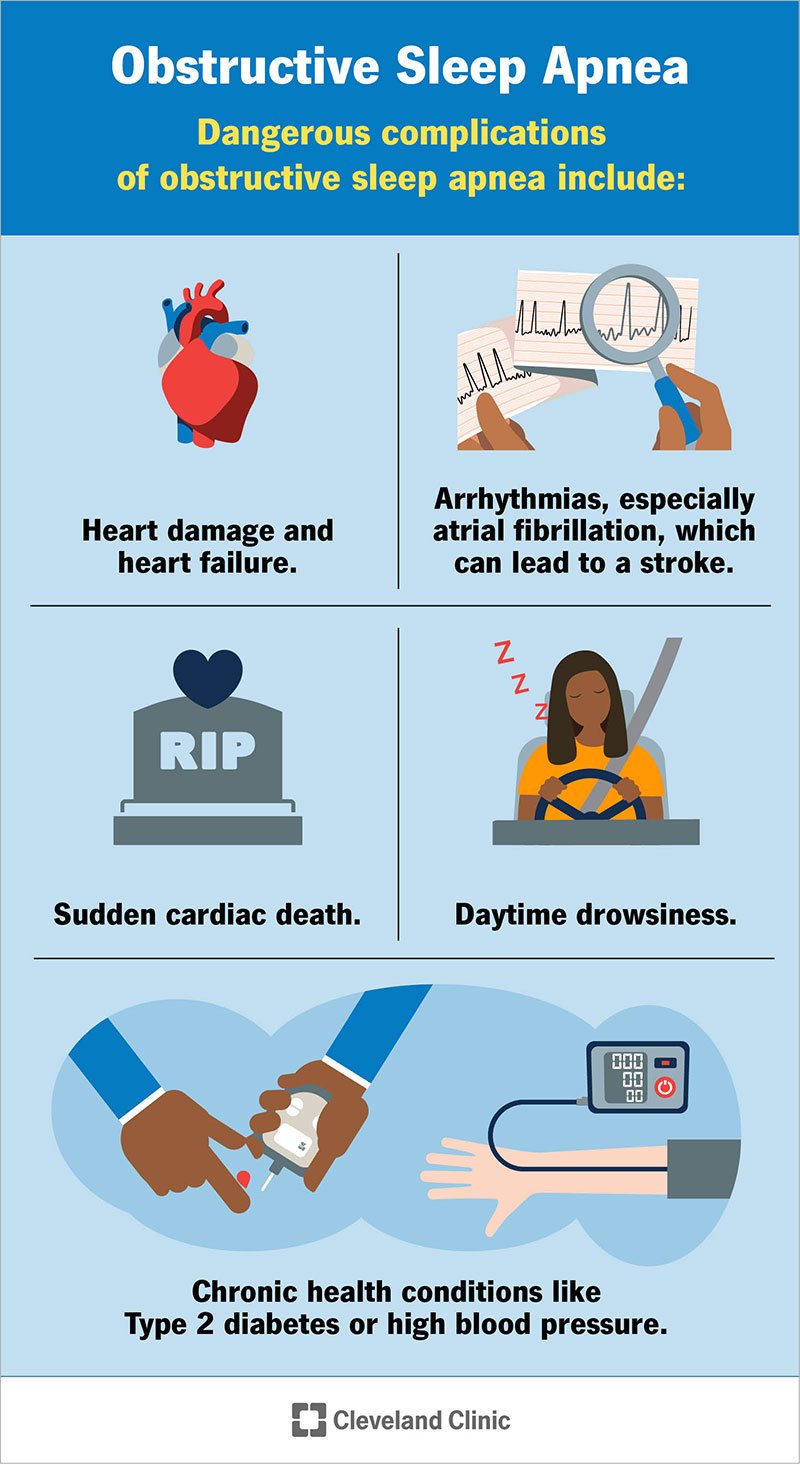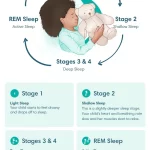If you’ve ever wondered what causes sleep apnea, you’re not alone. This common sleep disorder affects millions of people worldwide, disrupting their sleep and leaving them feeling exhausted during the day. But fear not, my friend, for I am here to shed some light on the matter. So, grab a cup of coffee and get ready to dive into the fascinating world of sleep apnea.
Now, you might be wondering, what exactly is sleep apnea? Well, dear reader, sleep apnea is a condition that causes pauses in breathing during sleep. These pauses, known as apneas, can last for a few seconds to a couple of minutes and can occur multiple times throughout the night. But what causes these apneas in the first place? Ah, that’s the million-dollar question! There are several factors that can contribute to the development of sleep apnea, and today, we’re going to explore some of the most common culprits. So, put on your detective hat and let’s get cracking!
Understanding Sleep Apnea: What Causes It and How to Manage It
Sleep apnea is a common sleep disorder that affects millions of people worldwide. It is characterized by pauses in breathing or shallow breathing during sleep. These interruptions in normal breathing can occur multiple times throughout the night, leading to fragmented sleep and a range of health issues. Understanding the causes of sleep apnea is crucial for effective management and treatment. In this article, we will explore the various factors that contribute to the development of sleep apnea and discuss strategies for managing this condition.
1. Obesity and Excess Weight
Obesity and excess weight are significant risk factors for sleep apnea. The accumulation of fatty tissues around the neck and throat can narrow the airway, making it more difficult to breathe during sleep. This can lead to episodes of apnea, where breathing temporarily stops or becomes shallow. Losing weight through a combination of healthy eating and regular exercise can help alleviate the symptoms of sleep apnea, as it reduces the pressure on the airway.
Moreover, obesity is often associated with other factors that can worsen sleep apnea, such as poor muscle tone and increased inflammation. These factors further contribute to airway obstruction and disrupted breathing patterns during sleep. Therefore, adopting a holistic approach to weight management is vital for individuals with sleep apnea.
A Healthy Diet and Regular Exercise
Maintaining a healthy weight is key to managing sleep apnea. Adopting a balanced diet that is rich in fruits, vegetables, lean proteins, and whole grains can support weight loss efforts. Additionally, incorporating regular exercise into your routine can help burn calories, improve overall fitness, and reduce the severity of sleep apnea symptoms. Aim for at least 150 minutes of moderate-intensity aerobic activity each week, along with strength training exercises twice a week.
It is important to consult with a healthcare professional or a registered dietitian before starting any weight loss program or exercise regimen, especially if you have underlying health conditions or concerns.
2. Structural Abnormalities in the Upper Airway
Structural abnormalities in the upper airway can also contribute to the development of sleep apnea. Conditions such as a deviated septum, enlarged tonsils or adenoids, and a narrow throat or airway can increase the risk of airway obstruction during sleep. These structural issues can be present from birth or develop later in life.
Addressing structural abnormalities often requires medical intervention. For example, surgical procedures may be necessary to correct a deviated septum or remove enlarged tonsils or adenoids. Continuous positive airway pressure (CPAP) therapy, which involves wearing a mask that delivers a steady stream of air pressure, is another commonly prescribed treatment for sleep apnea.
Treatment Options for Structural Abnormalities
If you suspect that structural abnormalities may be contributing to your sleep apnea, it is important to consult with an otolaryngologist or an ear, nose, and throat specialist. They can assess your condition and recommend appropriate treatment options, such as surgery or CPAP therapy. It is crucial to follow their guidance and regularly monitor your condition to ensure effective management of sleep apnea.
3. Age and Gender
Sleep apnea can affect individuals of all ages, but it becomes more prevalent with age. As we get older, the muscles in the throat and tongue may lose tone, leading to increased airway collapse during sleep. Additionally, hormonal changes that occur during menopause can contribute to the development or worsening of sleep apnea in women.
Men are generally more prone to sleep apnea than women, although the risk for women increases after menopause. This gender difference may be partly attributed to anatomical and hormonal factors. However, it is important to note that sleep apnea can affect anyone, regardless of age or gender.
Age-Related Changes and Hormonal Factors
While age-related changes and hormonal factors cannot be completely avoided, there are strategies to help manage sleep apnea symptoms. Regular exercise, maintaining a healthy weight, and practicing good sleep hygiene can all contribute to better sleep quality and reduced apnea episodes. Additionally, seeking medical advice and exploring treatment options tailored to your specific needs can significantly improve your sleep apnea management.
4. Smoking and Alcohol Consumption
Smoking and alcohol consumption can exacerbate the symptoms of sleep apnea. Smoking irritates the airways, leading to inflammation and increased airway resistance. This can further restrict airflow during sleep, worsening sleep apnea symptoms. Alcohol, on the other hand, relaxes the muscles in the throat and tongue, making them more prone to collapse and obstruct the airway.
The Impact of Smoking and Alcohol on Sleep Apnea
If you are a smoker, quitting smoking is one of the most beneficial steps you can take to improve your sleep apnea symptoms. Not only will it reduce airway inflammation, but it will also improve overall lung health and reduce the risk of other respiratory conditions. Similarly, reducing or eliminating alcohol consumption can help minimize muscle relaxation in the throat and improve breathing patterns during sleep.
5. Genetics and Family History
Genetics and family history can play a role in the development of sleep apnea. Certain genetic traits and anatomical characteristics inherited from parents can increase the risk of airway obstruction during sleep. If you have a family history of sleep apnea, it is important to be aware of the potential risk and take proactive measures to manage your sleep health.
Managing Sleep Apnea with Genetic Predisposition
While you cannot change your genetic makeup, you can still take steps to manage sleep apnea effectively. By adopting a healthy lifestyle, maintaining a healthy weight, and following recommended treatment options, you can mitigate the impact of genetic factors on the development and progression of sleep apnea.
Exploring Treatment Options for Sleep Apnea
In addition to addressing the underlying causes of sleep apnea, there are various treatment options available to manage this sleep disorder. These treatment approaches aim to improve breathing, enhance sleep quality, and reduce the associated health risks. Some common treatment options include:
– Continuous positive airway pressure (CPAP) therapy
– Oral appliances
– Surgery
– Lifestyle modifications
It is important to consult with a healthcare professional to determine the most appropriate treatment plan for your specific needs. They can assess the severity of your sleep apnea, consider your medical history, and recommend the best course of action.
Conclusion
Sleep apnea is a complex sleep disorder with multiple contributing factors. By understanding the underlying causes and implementing effective management strategies, individuals with sleep apnea can significantly improve their sleep quality and overall well-being. From adopting a healthy lifestyle to exploring medical interventions, there are various approaches to managing sleep apnea and reducing its impact on daily life. If you suspect you may have sleep apnea, it is important to seek medical advice and work closely with healthcare professionals to develop a comprehensive treatment plan. Remember, effective management of sleep apnea can lead to better sleep, improved health, and a higher quality of life.
Key Takeaways: What Causes Sleep Apnea?
- Obesity and excess weight can contribute to sleep apnea.
- Having a large neck circumference increases the risk of sleep apnea.
- Narrow airways due to genetic factors or physical abnormalities can lead to sleep apnea.
- Smoking and alcohol consumption can worsen sleep apnea symptoms.
- Certain medical conditions, such as hypertension and diabetes, are associated with sleep apnea.
Frequently Asked Questions
What is sleep apnea?
Sleep apnea is a sleep disorder characterized by pauses in breathing or shallow breaths during sleep. These pauses can last for a few seconds to minutes and may occur multiple times throughout the night. Sleep apnea can be categorized into three types: obstructive sleep apnea, central sleep apnea, and complex sleep apnea syndrome.
Obstructive sleep apnea is the most common type and occurs when the airway becomes partially or completely blocked during sleep. Central sleep apnea, on the other hand, is caused by a failure of the brain to signal the muscles to breathe. Complex sleep apnea syndrome is a combination of both obstructive and central sleep apnea.
What are the causes of sleep apnea?
There are several factors that can contribute to the development of sleep apnea. One of the main causes is obesity, as excess weight can lead to the narrowing of the airway. Other risk factors include a large neck circumference, smoking, alcohol consumption, and family history of sleep apnea.
Structural abnormalities in the airway, such as enlarged tonsils or a deviated septum, can also contribute to sleep apnea. Additionally, certain medical conditions like hypothyroidism and heart failure can increase the risk of developing sleep apnea.
Can sleep apnea be genetic?
While sleep apnea is not directly inherited, there is evidence to suggest that genetics may play a role in its development. Studies have shown that individuals with a family history of sleep apnea are at a higher risk of developing the condition themselves.
Genetic factors can influence the structure and function of the airway, making it more susceptible to collapse during sleep. However, it is important to note that genetic predisposition is not the sole cause of sleep apnea, and other environmental and lifestyle factors also contribute to its occurrence.
Does alcohol consumption cause sleep apnea?
Alcohol consumption can worsen the symptoms of sleep apnea and increase the frequency and duration of breathing pauses during sleep. This is because alcohol relaxes the muscles in the throat, including those that help keep the airway open.
When the muscles relax, the airway becomes more prone to collapse, leading to episodes of sleep apnea. It is recommended to limit or avoid alcohol consumption, especially close to bedtime, to improve sleep quality and reduce the risk of sleep apnea.
Can sleep apnea be cured?
While sleep apnea cannot be cured, it can be effectively managed with appropriate treatment. The most common treatment for sleep apnea is continuous positive airway pressure (CPAP) therapy, which involves wearing a mask over the nose or mouth during sleep to deliver a constant flow of air and keep the airway open.
Lifestyle changes, such as weight loss, regular exercise, and avoiding alcohol and sedatives, can also help improve sleep apnea symptoms. In some cases, surgical interventions may be considered to address structural abnormalities in the airway. It is important to consult a healthcare professional for an accurate diagnosis and appropriate treatment plan.
Final Thoughts: Understanding the Causes of Sleep Apnea
After diving into the topic of sleep apnea and its causes, it’s clear that this sleep disorder is influenced by a variety of factors. While there isn’t a single definitive cause for sleep apnea, several key factors contribute to its development. These include obesity, smoking, alcohol consumption, family history, and certain anatomical features such as a thick neck or narrow airway passages.
One of the primary culprits behind sleep apnea is obesity. The excess weight can put pressure on the airway, making it more difficult for air to flow freely during sleep. Additionally, smoking and alcohol consumption can relax the muscles in the throat, leading to blockages and interrupted breathing patterns. Family history also plays a role, as genetics can predispose individuals to certain anatomical characteristics that increase the likelihood of developing sleep apnea.
In conclusion, sleep apnea is a complex disorder with multiple contributing factors. By understanding the causes and risk factors associated with sleep apnea, individuals can take proactive steps to reduce the likelihood of developing this condition. Maintaining a healthy weight, avoiding smoking and excessive alcohol consumption, and seeking treatment for underlying anatomical issues can all help alleviate the symptoms and improve overall sleep quality. Remember, knowledge is power, and by staying informed, we can all take charge of our sleep health.




